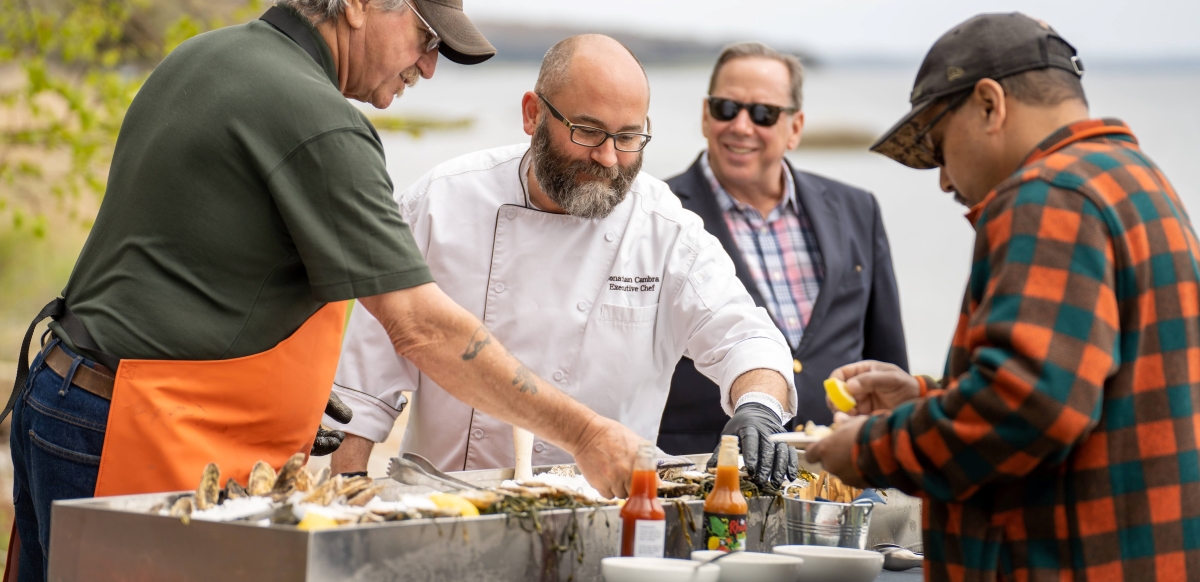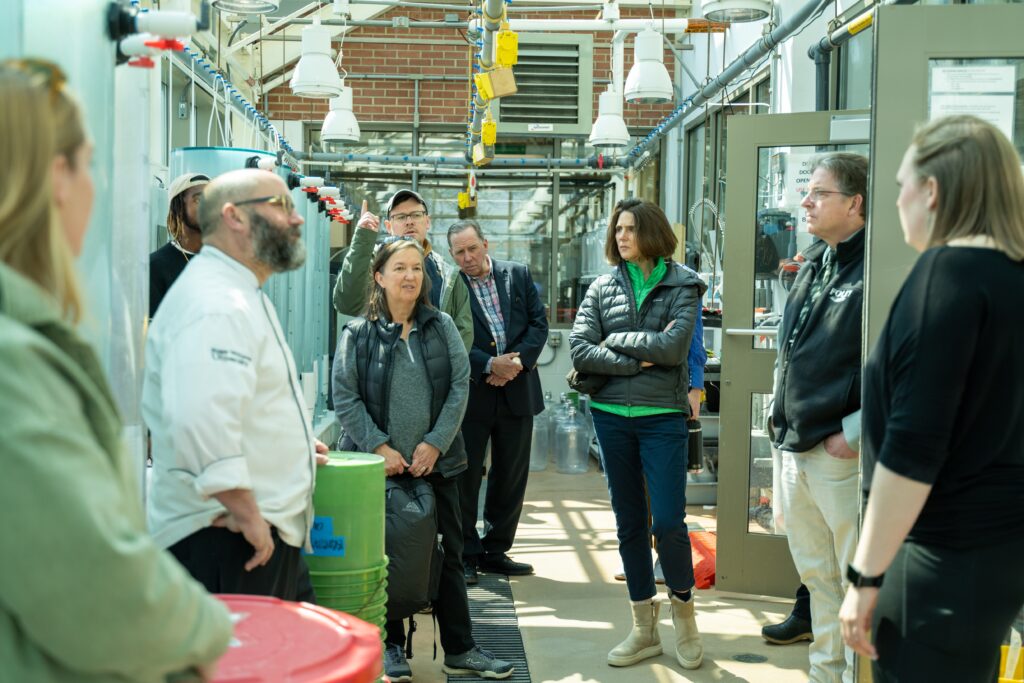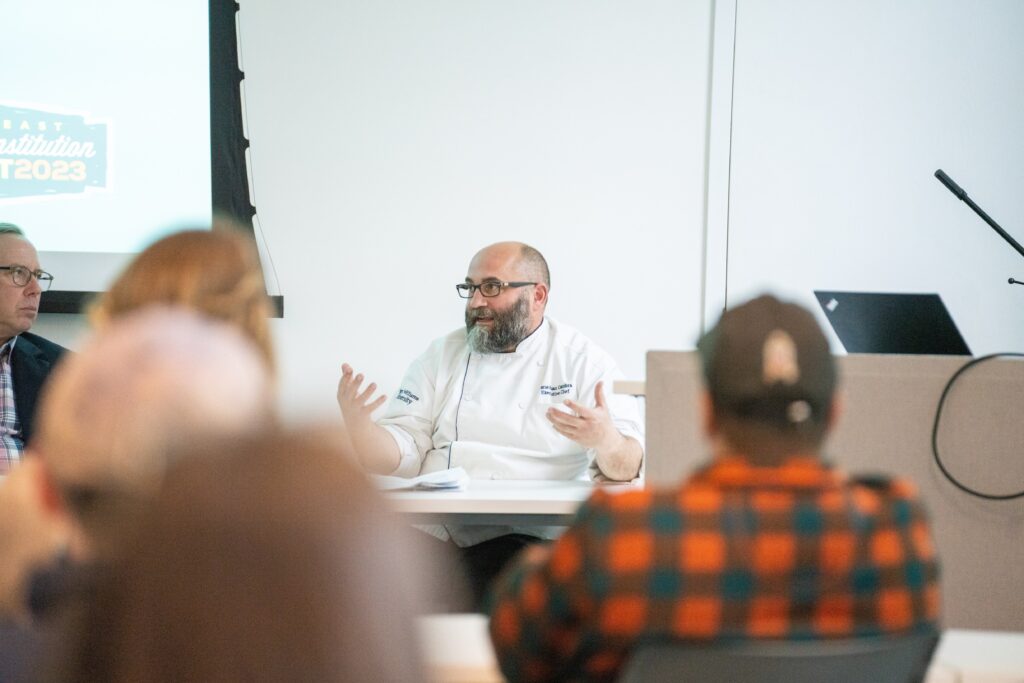Farm to Institution Northeast Summit Brings Together Food Systems Professionals
- by Elise Dudley

From left, Professor Emeritus and Shell-fisherman Dale Leavitt, and Director of Culinary Operations Jonathan Cambra work the raw bar as Resident District Manager James Gubata looks on. Photo Credit: Stacey Pacheo/Roger Williams University
In late April, food system professionals gathered virtually and in person for the annual Northeast Farm to Institution Summit, with Bon Appétiters leading multiple events.
Bon Appétit Local and Equitable Sourcing Specialist Shira Kauffman held a virtual presentation entitled Local Purchasing in Action at Bon Appétit providing over 30 attendees, including Farm to Institution New England (FINE) Executive Director Peter Allison with an in-depth look at Bon Appétit’s Farm to Fork program. The presentation detailed Farm to Fork’s purchasing categories, enrollment guidelines, as well as an example of a successful partnership in Horse Listeners Orchard, a beloved partner to Bon Appétit teams throughout New England.
In person, the local Bon Appétit team was proud to participate in several events as well, including co-hosting a field trip entitled Sustainable Shellfish – Production to Consumption at Roger Williams University in partnership with Roger Williams. Bon Appétit at Roger Williams Resident District Manager James Gubata, Roger Williams Director of Culinary Operations Jonathan Cambra, and Bon Appétit east coast Fellow Elise Dudley joined a roster of Roger Williams educators and researchers, and visiting food system professionals.
The morning opened at the scenic Mount Hope Bay Sailing Center where James set the scene for the day ahead and shared about the Pokanoket indigenous people, whose diets relied heavily on oysters, mussels, scallops, and clams. Tours of the Shellfish Program commenced, led by the Center for Economic and Environmental Development (CEED) Shellfish Field Operations Manager Susanna Osinski, Roger Williams Microalgae Manager Shawna Chamberlin, and a Roger Williams second-year, Jill Haudenshield, who works on multiple facets of the farm and hatchery.

Attendees explore Roger Williams’ wet lab and shellfish hatchery. Photo Credit: Stacey Pacheo/Roger Williams University
The wet lab and hatchery portion of the tour, led by Shawna, began with a deep dive into microalgae production which are cultivated to meet the nutritional needs of each developmental stage of shellfish. Shawna elaborated on the lifecycle of shellfish, from spawning to microscopic larvae, until they cement to a substrate to grow into adults, eventually leaving for the nursery when they are too big to feed on algae.
Everyone reconvened on the shores of Mount Hope Bay with Jonathan as well as Professor Emeritus and shell-fisherman Dale Leavitt for a raw bar featuring three different types of oysters: West Island oysters from Dale’s farms in Massachusetts, Rough Waters from local oyster farmer Matt Griffin, and FerryCliff oysters raised at Roger Williams just a few steps away from where they were served. Even though all oysters on the East coast are the same species, the Eastern Oyster (Crassostrea virginica), each hatchery has distinct marine terroir because as filter feeders, oysters reflect their environmental conditions. As everyone indulged, CEED Director Dr. Katherine Sharp spoke to the group more about the goals and scope of CEED’s work in Rhode Island.
The group then ventured to Upper Commons dining hall for a bounty of locally sourced seafood from Foley Fish featured on nearly every station including:
- New England Shellfish Mozambique of Maine mussels, Narragansett Bay littleneck clams, Point Judith squid, and Georges Bank scallops
- Fried Point Judith squid tossed with banana peppers, butter, parsley, and garlic sauce
- Penne in white sauce with Narragansett Bay littleneck clams
- Redfish tacos and seafood chowder with scup, lobster, squid, and scallops
Finally, the day closed in the Mary Tefft White Room of the University Library with a panel moderated by Bon Appétit Fellow Elise Dudley that explored intersections between shellfish aquaculture, education, student engagement, menuing, and institutional procurement.

Roger Williams Director of Culinary Operations Jonathan Cambra speaks during the panel session. Photo Credit: Stacey Pacheo/Roger Williams University
Jonathan immediately captured the attention of the room with his sincere passion for using his position as a chef to support local fishermen and farmers. The fruitful discussion that followed considered the need for consumer education, and the role of schools and universities, among other themes. Jonathan shared, “we’re doing everything we can by menuing [underutilized] species consistently” through weekly creative approaches. Jonathan also spoke to balancing budgets and price points, and the need for customer buy-in because “good food costs money.”
Kate Masury from Eating with the Ecosystem and Fred Weckman from Foley Fish shared that building demand and strengthening education around a greater diversity of under-loved seafood species in a way that sustains aquatic ecosystems. Susanna expanded on how promoting local food production is equipping the next generation to work in aquaculture and fisheries. Dale Leavitt explained his perspective as a shellfisherman who is vulnerable to poor management of waste treatment plants and other sources that pollute environmental water quality, “without good water quality, I’m out of business… we’re playing with my livelihood.”
Bon Appétit was honored to participate in the Northeast Farm to Institution Summit and host food system professionals to learn about and discuss issues critical to this region.